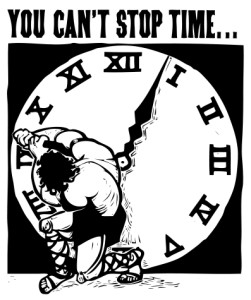Radically Centered: Daylight Saving Time is a Failed Experiment
Daylight Saving Time is nothing more than an arbitrary exercise in controlling the uncontrollable. So why do we continue to do it?
By Justin Shimko
Sunday morning, churchgoers will wake up to alarms that are seemingly earlier than normal. Monday morning, parents will struggle to wake up their kids as toddlers on up to high schoolers will struggle against their Circadian Rhythm to make it to school on time. Evening commuters in the Chicagoland will fight the month-long war against their visors, trying to keep the not-quite-setting sun from blinding them while they drive westward home, jolted by the sudden change of the sun’s position from their drive just a few days earlier.
 It’s no secret, Daylight Saving Time is a nightmare. We get used to it, sure, but the first seven days are no different than being strapped to a chair with nothing but Adam Sandler’s latest movies playing, non-stop.
It’s no secret, Daylight Saving Time is a nightmare. We get used to it, sure, but the first seven days are no different than being strapped to a chair with nothing but Adam Sandler’s latest movies playing, non-stop.
It’s brutal.
And unnecessary.
This year’s Daylight Saving change arrives at the earliest possible date, March 8. What was originally designed as an effort to reduce energy consumption, increase child safety and I guess get the cows milking earlier in the summer months has turned into an attack on our health, our energy bills and our common sense. Did we honestly think arbitrarily messing with time would actually net a positive result?
The theory went that the extra hour of sunlight in the evenings would result in less electricity usage as families would wait longer before turning on the lights and sitting down in front of the television. Unfortunately, that theory did not take into account the massive popularity of air conditioning, especially as our climate continues to warm up, and consumption has shown to increase because of the time change.
But what about our safety? The extra hour would surely reduce crime, make it easier on children taking the bus to school and get into fewer accidents, right? Sadly, that does not benefit overall. While there appears to be a slight decrease in crime, there is a spike in accidents and injuries in the weeks following time changes.
Health-wise, we are just begging for heart attacks, sleep deprivation, shorter tempers and a host of other clock-changing problems. Recent studies show heart attack risks increase 10 percent in the days after losing an hour of sleep. Those accident spikes are typically correlated to an increased number of drivers falling asleep at the wheel, the result of losing an average of 40 minutes of sleep. And when you lose sleep you lose cognitive function, increase your risk of stroke and weight gain, and are just a crabby person overall. And for many people, this is not just in that first week. A study in 2007 showed that these negative health effects can last eight weeks after changing time like we are the masters of the universe.
In the end, Daylight Saving Time is exercise in controlling the uncontrollable. No matter how hard we try, the sun still rises and sets, the days get longer as we get closer to summer and short towards winter, temperatures rise and fall, and we still need to get to work, go to school, go to church/synagogue/temple/brunch, and we live our lives. Adjusting the clock by an hour in March and November only disrupts our daily lives, and for no good reason.
I don’t think I’m preaching to the choir, though. Today, changing the clocks has become even more unpopular, with just 37 percent of the population in 2013 believing the benefits of pushing the clocks forward outweigh the benefits. That’s an eight point drop from the year before.
Farmers are wholly opposed to Daylight Saving Time. They work based upon the sun, not an arbitrary clock. Moving a clock does not wake the livestock earlier, but it changes when the farmers can start their day based upon when the dew is done burning off and, because that is a later time in the day, results in fewer hours they can get from their hired hands.
Airlines also possess a negative view of our time change. With Daylight Saving Time not a universal movement - this is mostly a European/North American thing in the summer and a South American thing, save for one country in Africa and a couple of Australian states, in the winter. Even the date of the time change is inconsistent among the observant. All of this results in a headache of trying to manage schedules that depend on time, even one so notoriously late as the airline industry.
So why are we still changing our clocks every March and November? Because Congress is the real puppet master of time, or so they think. Until Congress and the White House get involved in Daylight Saving Time, like they last did in 2007, we will keep changing our clocks, pretending it has any actual benefit to our lives.
Maybe it will take a petition to the White House to start the movement. Or maybe it will take a massive push for Congress to address this problem. Or maybe we need to force more states to stop observing Daylight Saving Time in order for it to be inconsequential.
Until then, rest up and get ready. Daylight Saving Time is just around the corner.
Justin Shimko is an award-winning writer and political analyst. He began as a reporter in his college days at the University of Oklahoma, writing for The Oklahoma Daily (rated as one of the best collegiate newspapers in the nation) and The Oklahoman, the statewide newspaper, winning awards from the CSPA and the Society of Professional Journalists. He later moved on to research and writing work for a number of political campaigns. His email is
[email protected]
Latest posts by Justin Shimko (see all)
Related
 Blog Posts
Blog Posts






Radically Centered: Daylight Saving Time is a Failed Experiment
Daylight Saving Time is nothing more than an arbitrary exercise in controlling the uncontrollable. So why do we continue to do it?
By Justin Shimko
Sunday morning, churchgoers will wake up to alarms that are seemingly earlier than normal. Monday morning, parents will struggle to wake up their kids as toddlers on up to high schoolers will struggle against their Circadian Rhythm to make it to school on time. Evening commuters in the Chicagoland will fight the month-long war against their visors, trying to keep the not-quite-setting sun from blinding them while they drive westward home, jolted by the sudden change of the sun’s position from their drive just a few days earlier.
It’s brutal.
And unnecessary.
This year’s Daylight Saving change arrives at the earliest possible date, March 8. What was originally designed as an effort to reduce energy consumption, increase child safety and I guess get the cows milking earlier in the summer months has turned into an attack on our health, our energy bills and our common sense. Did we honestly think arbitrarily messing with time would actually net a positive result?
The theory went that the extra hour of sunlight in the evenings would result in less electricity usage as families would wait longer before turning on the lights and sitting down in front of the television. Unfortunately, that theory did not take into account the massive popularity of air conditioning, especially as our climate continues to warm up, and consumption has shown to increase because of the time change.
But what about our safety? The extra hour would surely reduce crime, make it easier on children taking the bus to school and get into fewer accidents, right? Sadly, that does not benefit overall. While there appears to be a slight decrease in crime, there is a spike in accidents and injuries in the weeks following time changes.
Health-wise, we are just begging for heart attacks, sleep deprivation, shorter tempers and a host of other clock-changing problems. Recent studies show heart attack risks increase 10 percent in the days after losing an hour of sleep. Those accident spikes are typically correlated to an increased number of drivers falling asleep at the wheel, the result of losing an average of 40 minutes of sleep. And when you lose sleep you lose cognitive function, increase your risk of stroke and weight gain, and are just a crabby person overall. And for many people, this is not just in that first week. A study in 2007 showed that these negative health effects can last eight weeks after changing time like we are the masters of the universe.
In the end, Daylight Saving Time is exercise in controlling the uncontrollable. No matter how hard we try, the sun still rises and sets, the days get longer as we get closer to summer and short towards winter, temperatures rise and fall, and we still need to get to work, go to school, go to church/synagogue/temple/brunch, and we live our lives. Adjusting the clock by an hour in March and November only disrupts our daily lives, and for no good reason.
I don’t think I’m preaching to the choir, though. Today, changing the clocks has become even more unpopular, with just 37 percent of the population in 2013 believing the benefits of pushing the clocks forward outweigh the benefits. That’s an eight point drop from the year before.
Farmers are wholly opposed to Daylight Saving Time. They work based upon the sun, not an arbitrary clock. Moving a clock does not wake the livestock earlier, but it changes when the farmers can start their day based upon when the dew is done burning off and, because that is a later time in the day, results in fewer hours they can get from their hired hands.
Airlines also possess a negative view of our time change. With Daylight Saving Time not a universal movement - this is mostly a European/North American thing in the summer and a South American thing, save for one country in Africa and a couple of Australian states, in the winter. Even the date of the time change is inconsistent among the observant. All of this results in a headache of trying to manage schedules that depend on time, even one so notoriously late as the airline industry.
So why are we still changing our clocks every March and November? Because Congress is the real puppet master of time, or so they think. Until Congress and the White House get involved in Daylight Saving Time, like they last did in 2007, we will keep changing our clocks, pretending it has any actual benefit to our lives.
Maybe it will take a petition to the White House to start the movement. Or maybe it will take a massive push for Congress to address this problem. Or maybe we need to force more states to stop observing Daylight Saving Time in order for it to be inconsequential.
Until then, rest up and get ready. Daylight Saving Time is just around the corner.
Justin Shimko
Latest posts by Justin Shimko (see all)
Share this:
Related